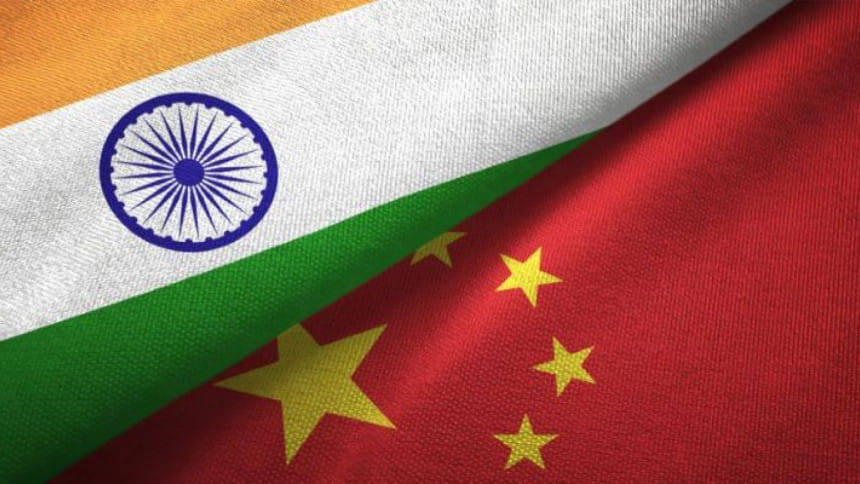Bangladesh elections and China-India rivalry

The Daily Star proudly introduces a fresh addition to our editorial repertoire: Geopolitical Insights. As we navigate the labyrinth of global power dynamics, we hope this weekly page will provide interesting perspectives to help our readers understand the global challenges better. This article published in the first issue focuses on exploring the global power play in Bangladesh's elections. – Mahfuz Anam, Editor & Publisher
The recent presidential election in the Maldives reflected a theatre for India-China competition, with the president-elect, Mohamed Muiz, making "India out" a central theme in his campaign. We also witnessed the two major powers jockeying for influence in the Nepalese election in 2022. While the political landscape in Bangladesh differs from that of its two South Asian neighbours, the India-China contest remains a crucial factor. Over the course of the past 15 years, both countries have deepened their stakes in Bangladesh, which is clearly evident in the growing geopolitical tension surrounding the upcoming election.
China is now Bangladesh's largest trade partner, with bilateral trade currently valued at $25 billion. Since joining China's Belt and Road Initiative (BRI) in 2016, China has committed over $38 billion in investments to Bangladesh. The country is second among all sources of Foreign Direct Investment (FDI) in Bangladesh.
Furthermore, during the current regime's tenure, China-Bangladesh defence cooperation has reached unprecedented levels. China has maintained its position as the chief supplier of light weapons to Bangladesh since the 1970s, with over 70 percent of Bangladesh's weapons procurement between 2015 and 2022 originating from China, according to SIPRI. Notably, China has been instrumental in the construction of Bangladesh's first submarine base, the BNS Sheikh Hasina, with a total investment of $1.2 billion, located in Pekua within Cox's Bazaar.
China's approach to Bangladesh during the ruling Awami League's regime can be summarised as bolstering economic ties while refraining from criticising democratic backsliding in the country. China was the first country to welcome the AL government after the one-sided 2014 elections, and it didn't hesitate to congratulate them on their big win in the equally controversial 2018 elections.
Furthermore, unlike economic aid from the US and Europe, Chinese investments in Bangladesh's infrastructure come without conditions related to human rights, good governance, or democracy. As a result, this has allowed the AL government to lessen its dependence on Western donors.
Regarding the forthcoming election, China has consistently adhered to a stance that aligns with its overarching strategy, as aptly articulated by Chinese Ambassador to Bangladesh, Yao Wen, who stated, "Our policy always remains the same. China never intervenes in other country's internal issues. I can say the election is the internal affairs of Bangladesh. It has to be decided by the Bangladesh people."
China also opposes any external pressure exerted by the United States concerning the election. This stance is endorsed at the highest level of Chinese leadership. On August 23, 2023, during a meeting with Prime Minister Sheikh Hasina on the sidelines of the BRICS summit, Chinese President Xi Jinping stated, according to a readout from China's foreign ministry, that China supports Bangladesh in "opposing external interference" and that Beijing will collaborate with Dhaka to mutually support their core interests.
In the upcoming election, if the ruling party emerges victorious, Chinese influence may strengthen even further. Conversely, if the AL loses, and the opposition BNP comes to power, there is relatively minimal risk for China to lose its stake, given the historically favourable relations between BNP and China.
Now, let's delve deeper into India's interests in Bangladesh's upcoming election. As its largest neighbour, India undeniably holds a substantial stake in the electoral proceedings. The increasing asymmetrical power dynamics between these two nations have brought this influence into sharper focus.
In his book titled "1971-2021: Bangladesh-Bharat Shomporker Ponchash Bochor" (1971-2021: 50 years of Bangladesh-India relations), former Bangladeshi Foreign Secretary Touhid Hossain has shed light on the nature of the deepening political reliance on India. He articulates, "It is widely believed that no one can ascend to the throne of Bangladesh without India's approval. Statements supporting this notion have emanated from senior political figures on occasion. Many believe that India's consent is a prerequisite for appointments to key positions within Bangladesh. India's direct involvement in legitimising the 2014 election is well-documented. It was so apparent that even the leaders of the political party (the BNP), whose political foundation is rooted in anti-Indianism, had to reach out to India in an attempt to gain favour ahead of the 2018 election, although their endeavours ultimately yielded no success."
India's growing influence has fostered stronger bilateral ties with the AL-led Bangladesh government, characterised by terms like "very special relationship," "golden chapter," and "model for the entire region." The AL government has addressed India's security concerns, particularly access to northeastern India, through connectivity projects and action against anti-India insurgent groups. In return, India has steadfastly supported the AL government, overlooking democratic setbacks in Bangladesh. As regards the upcoming election, a significant portion of the Indian media and think tanks continue to advocate support for the current regime.
Nevertheless, some experts believe that India has adopted a different stance towards the 2024 elections.
Indicating this changed position, Indian columnist Arkoprabho Hazra wrote in The Diplomat, "India is taking a much more inclusive approach toward the 2024 Bangladesh national elections, rather than putting all its bets on the Awami League as seen in the past."
He emphasised that India has expressed interest in ensuring violence-free and democratic national elections in Bangladesh, aligning with the US stance. Recent discussions between Indian and US security establishments suggest, according to Hazra, a potential collaborative effort on election issues. This marks a departure from the 2018 elections when India and the US held divergent views. Nevertheless, Prime Minister Modi's swift congratulations to Prime Minister Hasina for her victory helped alleviate international criticism of the election's conduct.
Yet it is worth noting that India has refrained from publicly responding to the growing pressure exerted by the United States on Bangladesh, including visa measures, aimed at ensuring a free, fair, and participatory election.
Professor Ali Riaz offers three possible explanations for India's deliberate silence: "Firstly, India may be comfortable with the existing political status quo, as demonstrated by its tacit support for Prime Minister Hasina amid US concerns about democratic erosion. Secondly, India might not oppose US pressure on Bangladesh, recognising that it could make Hasina more dependent on India as a mediator between her government and the United States. Lastly, India seems to acknowledge its diminishing role in Bangladeshi politics amid the US-China geopolitical rivalry, making it a secondary external actor in the region."
Regardless of the reasons behind India's muted response, it's evident that the US has shifted its perspective away from viewing the Bangladesh issue solely through the Indian lens. Instead, its emphasis on promoting democracy in Bangladesh, primarily driven by the aim to counteract China's growing influence in the country, will significantly influence India's stance on the 2024 elections in Bangladesh.
India finds itself in a complex and delicate position. There is unease over Bangladesh's growing reliance on China for economic aid and infrastructure development, at times straining the India-Bangladesh relationship. Additionally, there is apprehension that excessive pressure from the US on election-related matters could lead Bangladesh closer to China.
However, Michael Kugelman, director of the Wilson Centre's South Asia Institute, suggested in an interview with Prothom Alo that the US believes India, by leveraging its influence over Bangladesh, can steer it away from such an alignment. Furthermore, the current regime in Bangladesh expects India to advocate for Sheikh Hasina's government with the Biden administration.
India's response to these competing interests will be a pivotal factor in the upcoming elections, the outcome of which carries significant implications not only for Bangladesh but also for the Bay of Bengal region, a critical component of the global geopolitical hotspot, the Indo-Pacific.
Shamsuddoza Sajen is a journalist and researcher. He can be contacted at [email protected].
We welcome your contributions and analysis of global events. To submit articles to our new page, Geopolitical Insights, please send us an email at [email protected] or [email protected]
Follow The Daily Star Opinion on Facebook for the latest opinions, commentaries and analyses by experts and professionals. To contribute your article or letter to The Daily Star Opinion, see our guidelines for submission.

 For all latest news, follow The Daily Star's Google News channel.
For all latest news, follow The Daily Star's Google News channel. 








Comments